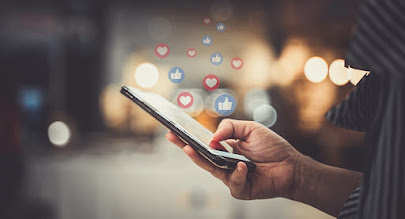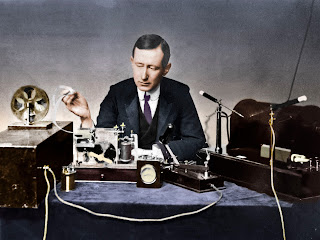Sunday, May 1, 2022
FINAL BLOG POST: My Relationship With Social Media
Tuesday, April 5, 2022
Post #11: Living in the Age of AI
The use of artificial intelligence and robots has become increasingly popular within recent years. This fact is alarming for several reasons, the main ones being lack of privacy and job security. This PBS documentary was very informative and eye-opening towards just how involved the government is in personal affairs and how almost every aspect of life is being monitored. Artificial intelligence is certainly a force to be reckoned with because it has the power to take over everything.
In terms of job security, artificial intelligence has been a driving factor in unemployment. Structural unemployment results from increased industrialization and technology use, replacing humans as the main source of labor. Many companies and employers nowadays work to solve the problem of efficiency, questioning how tasks can be completed with as few workers as possible. This is one of the leading factors for the rise in inequality in America, as automation takes jobs that would previously be carried out by people. Karl Marx outlines this struggle between capital and labor in many of his theories, showing a perpetual cycle of the rich getting richer and the poor getting poorer.
Artificial intelligence also poses a threat to both personal and national security. When it comes to social media, we are simply pawns in a much larger game of surveillance capital. Our search histories, favorited websites, liked content, and more are all tracked and used by digital exhaust to predict user interest. Technological devices that are marketed as “helpful” and “smart” tools such as Amazon’s Alexa and Google Home are actually used to gather data from each household. The data and information that is gathered are then used for micro-behavioral targeting efforts. The video also showed examples of how artificial intelligence can be dangerous on a political scale, such as in the ways it was used by China for political re-education. Surveillance is used to target people of the Uyghur culture and imprison them in camps, essentially committing genocide. Personally, I feel as if the cons of artificial intelligence outweigh the pros.
In conclusion, artificial intelligence tools threaten the system of democracy we have established. I’ve learned that it’s important to protect your data and ensure that your online presence is kept to a minimum to avoid surveillance. Artificial intelligence is definitely a scary innovation, but unfortunately, it is one that will only progress and grow stronger as time continues. I am interested to see what artificial intelligence will look like ten years down the road.
Monday, February 28, 2022
Post #10: Learning About the Echo Chamber
One of the most interesting concepts to learn about through the “each one teach one” presentations was the echo chamber. In his presentation, Henry opened with several examples that helped introduce the idea of echo chambers. For instance, he asked how many people thought the Lakers are overrated and those who did not raise their hand were seen as the “other side” who wasn’t a part of the majority's echo chamber. The echo chamber refers to a social structure from which other relevant voices have been actively discredited, creating almost a circle of only similar beliefs and opinions. People are conditioned to distrust contrary views or information from the "other side" which only reinforces their own ideas and convinces them that others are wrong. People from the “other side” are portrayed as lacking integrity, morals, and intelligence.
Why are echo chambers so dangerous to us as a society? Well, with echo chambers, you can expose the person to new information to try to change their views and open their minds, but it won't work because they don't trust any of the information sources or people that contradict their view. Additionally, it creates a massive divide within our country where both sides ostracize the other. For example, people who watch CNN think people who watch Fox are misinformed while people who watch Fox think people who watch CNN are misinformed. Both news networks have a strong bias towards either the right or left and it segregates people from each other because of their differing beliefs.
The only way to escape the echo chamber is by suspending all beliefs about preconceived notions, judgements, and essentially unlearning everything you’ve been told. Another important thing to remember is the importance of utilizing multiple forms of media and news sources to avoid falling into an echo chamber habit. Explore obscure websites, listen to opinions that differ from your own, and gather information to form your own beliefs, not just echo what has been told to you.
Post #9: How the Diffusion of Innovation Theory Applies to Facebook
Diffusion of innovations is a theory that seeks to explain how, why, and at what rate new ideas and technology spread (Wikipedia). One of the most impactful and widespread innovations within the past two decades is Facebook. Facebook was invented in 2004 by Mark Zuckerburg when he was only a sophomore in college. Studying at Harvard for computer science, he wanted to make a platform that connected Harvard students to other Harvard students. Little did Zuckerberg know, he made the first and most successful social media app to ever exist. Zuckerberg as well as the people who helped him create Facebook are known as the innovators, the ones who drive change and aim to fill a gap within society. Apparently, “after one day over one thousand people had registered,” (History.com). So many people became early adopters of Facebook because it was the first of its kind, simply put. Many of these early adopters and the early majority were college students. There was nothing comparable in the world to Facebook, which is how it has the fame it has today.
As time progressed, Facebook became more popular for people of older demographics as well. Many middle-aged people started making accounts and were categorized as the late majority. People love to be a part of what is new and coming, and Facebook was exactly that. However, as good as the idea of Facebook was, Zuckerberg was notorious for getting himself in trouble. Because of that, there were a lot of people who were late adopters of Facebook and even more who were late adopters who wound up dropping Facebook altogether. After Zuckerberg admitted that Facebook was stealing a lot of their user’s personal data, many people pulled out of using the platform. Plus, lawsuits were in full effect once this information was released to the public as well, giving Facebook a bad reputation that Zuckerberg never wanted. On the other hand, bad press is still press, and Facebook was getting a lot of it. I think the negative effects speak for themselves, but despite all the negativity that Facebook was getting, there are still so many people who stayed loyal. On top of that, there are still over 2 billion active Facebook users (History.com) to this day, which means that there are positives that outweigh the negatives.
As always, there are laggards who still don’t have Facebook and don’t ever intend on having it. These types of people usually want to stay clear of social media and are rightfully afraid of their personal information being sold or monitored. The selling point of Facebook is the fact that it can connect you to anyone, anywhere, at any time. The potential Facebook had back at Harvard in 2004 was nothing compared to what it blossomed into today and it has certainly made history as one of the most noteworthy innovations.
Sources:
Wikimedia Foundation. (2022, February 13). Diffusion of innovations. Wikipedia. Retrieved February 28, 2022, from https://en.wikipedia.org/wiki/Diffusion_of_innovations
A&E Television Networks. (2019, October 24). Facebook launches. History.com. Retrieved February 28, 2022, from https://www.history.com/this-day-in-history/facebook-launches-mark-zuckerberg#:~:text=On%20February%204%2C%202004%2C%20a,that%20was%20only%20the%20beginning
Post #8: The Dangers of Gatekeeping

There are several examples of information being gatekept by today’s media. For instance, there was a very important news conference held between Russia and Ukraine on February 17, 2022. It was challenging to find coverage on this critical conference because many American news outlets did not publish any stories about it or live-stream the event on their channels. People who wanted to know what was going on during the conference needed to search for more inconspicuous news sources. Below is a TedTalk by Randall Mikkelsen, a veteran journalist who is now managing editor at Thomson Reuters. In his talk, Mikkelsen describes the importance of being your own gatekeeper and how to combat fake news.
Gatekeeping has many negative implications. It limits the public’s access to seeking out accurate, unbiased information and it blurs the lines of what is true from what is false. Additionally, gatekeeping completely contradicts the principle of the marketplace of ideas. As a society, we are supposed to be exposed to multiple viewpoints and perspectives that way we are able to make informed decisions about which ones are best, but gatekeeping only allows certain voices to be heard. How can someone think for him or herself when they are being spoon-fed by the media? Gatekeeping goes against one of our most valued fundamentals in the United States: freedom. Without freedom and access to knowledge, we are confined to one set of belief systems as a whole and are unable to formulate our own opinions.
Sources:
Davie, G. (2018, November 2). Gatekeeping theory. Mass Communication Theory. Retrieved February 15, 2022, from https://masscommtheory.com/theory-overviews/gatekeeping-theory/#:~:text=Based%20on%20personal%20preference%2C%20professional,pass%20through%20the%20their%20audience.&text=Gatekeeping%20may%20also%20hold%20influence,into%20the%20audience's%20confirmation%20bias.
DeIuliis, D. (2015). In this gatekeeping theory from social fields to social ...cscc.scu.edu/trends/v34/crt_v34_n1_ ¢ mation - [PDF document]. vdocuments.mx. Retrieved February 15, 2022, from https://vdocuments.mx/in-this-gatekeeping-theory-from-social-fields-to-social-csccscuedutrendsv34crtv34n1.html
Shoemaker, P., Riccio, J., & Johnson, P. (2013). Gatekeeping. Oxford Bibliographies Online Datasets. https://doi.org/10.1093/obo/9780199756841-0011
Sunday, February 20, 2022
Post #7: How to Reduce Your Digital Footprint
At some point in every person’s life, we have all been warned of the dangers of our digital footprint. I have heard “Be careful of what you post, your future employer could see that” at least one hundred times. But what if we are leaving a digital footprint without even knowing it? As hard as someone can try to remain anonymous and limit their online presence, it’s virtually impossible with the data mining techniques and website surveillance that we are encountering today. My dad, for example, is someone who doesn’t have any social media; however, when you Google his name, a real estate website pops up providing his address and mortgage price as well as a website called usphonebook.com with his name and phone number attached. No wonder we get so many spam calls! Another example is Face.com. This website keeps an inventory of facial recognition from various sources including social media, tagged pictures, and even security camera footage. Like Juan Enriquez says in his Ted Talk, we all have electronic tattoos that follow us. The amount of personal information that is readily available to strangers on the internet is terrifying, but what’s even more frightening is the fact that companies, such as Facebook, can use that information against us.
These issues affect me and my family directly, as mentioned above. There is no such thing as privacy for anyone who has social media, and even for the ones who don’t. My family and I mainly utilize social media to keep in touch with long-distance relatives and to share memories. The fact that sites like Facebook can sell our personal information and data is very alarming. What’s even worse is nothing we can do to stop it because the terms and conditions of many social media platforms include a contract of adhesion. We are left virtually powerless in this fight for digital privacy.
Currently, there isn’t any regulation for digital privacy. The government should actively work to prevent tech companies from selling and distributing personal data, especially since many people do not realize they are voluntarily providing it. Additionally, phone tapping and social listening should be made illegal, unless being used for surveillance in a case of criminal activity. More legislation needs to be passed to improve data protection and invasive data mining.
There are measures we can take to minimize the invasions of privacy we experience on the internet. For example, clearing your cache and search history from your computer or laptop every so often is very important. Having a lot of information stored in your cache can affect the efficiency of your device and invite unsolicited monitoring. Additionally, declining cookies as often as possible prevents websites like Google from gathering your personal information. By taking these measures, you can limit the personal data you share online and minimize the risks that accompany having an online presence.
Saturday, February 12, 2022
Post #6: What I Learned From EOTO


Post #5: Combatting Mainstream News- Show me the Real Stuff
There were two major events in United States history that caused a serious distrust in the government. The first event was the Vietnam War, one of the most controversial and unnecessarily fought wars. The US government was not transparent about our chances of winning the war and continued to send troops knowing we would lose. Countless lives were lost for essentially no reason. Following the Vietnam War, President Nixon’s Watergate scandal finished destroying any remaining faith that was left in the government. The Nixon administration crumbled soon after and many politicians were labeled as corrupt and immoral from that point on. The American people shifted their trust towards the media and relied on journalists to uncover what was truly happening behind closed doors and what the government was hiding.
Censorship is a problem that has resurfaced within the last few years. The government tends to try to gatekeep any type of media that criticizes them, such as the ANTIWAR.COM website and the American Conservative. The reason why these types of websites are difficult to locate is that the government does not want to provide access to content that potentially contradicts the agenda they are trying to push for. Unfortunately, the government has the capacity to control search engine optimization and can block certain results whenever you try to Google or look something up. Much like companies and schools can block certain IP addresses from being searched while connected to the internet, the government can prevent people from seeking out these obscure websites. In the video attached below, Roya Ensafi, who is an Assistant Professor in the Computer Science and Engineering department at the University of Michigan, explains three ways in which information can be censored online and also how censorship has evolved in recent years.
It all boils down to one fact: The government doesn’t want opposition. Henry David Thoreau once said, “Disobedience is the true foundation of liberty. The obedient must be slaves.” The more informed the population is, then the more likely they are to resist. The government likes indifferent and deceived minds because those are the ones that are easiest to mold and gain control over. Our system of government is influenced by power dynamics, which is why the government works hard to make hearing antiwar (amongst other) voices very difficult.
Post #4: EOTO Radio
Before the Radio: Historical Context
Throughout the nineteenth and twentieth centuries, many scientists and innovators were in a race to revolutionize the way we communicated. While people could utilize written communication to send messages overseas, this was extremely time-consuming and inefficient if the circumstances were urgent, for instance, in times of war. By the time the message was received via postal service or other delivery methods, the issue was no longer relevant. Wireless communication was nearly something unimaginable before the nineteenth century. Thanks to James Clerk Maxwell publishing A Dynamical Theory of the Electromagnetic Field in 1865, the existence of electromagnetic waves was proven and this inspired many other scientists to begin research and experimentation. Heinrich Hertz confirmed Maxwell’s findings and also developed the first transmitter, antenna, and receiver apparatus. Great strides were continuing to be made in the following years with inventions such as the telephone, created by Alexander Graham Bell in 1876. All of this technological exploration led to the invention of the radio.
Creation of the Radio: The Process of Invention
Although there is a lot of controversy regarding who the true inventor of the radio is, the scientific community generally agrees that the innovative breakthrough can be attributed to Guglielmo Marconi. Not only did Marconi improve upon Hertz’s advancements, but he also discovered a way to commercialize the apparatus that was created, thus giving way to radiotelegraphy. In 1895-1896, Marconi began to experiment with sending long-distance Morse Code messages, which turned out to be a great success. In 1897, he received an official British patent for the radio; however, in the United States, Nikola Tesla is recognized as the inventor who holds the patent for the radio because later evidence suggested that Tesla had been sending signals at a distance since 1893. Regardless of who has the official credit for creating the radio, it was certainly a piece of technology that changed communication forever.
The Radio: How it Impacted the World
In 1919, General Electric purchased Marconi’s technology. David Sarnoff, who was previously a telegraph operator for Marconi, produced the idea of “broadcasting” and eventually was the president of the Radio Corporation of America. Even though the original radio model was not portable, future models became more compact and the general public began buying them. The radio had significant effects on the way society functioned socially, politically, and economically, especially in the 1920s. Broadcasting transformed mass communication and introduced a new way to deliver information quickly and effectively to large numbers of people at once. New doors were opened that assisted in making life easier. Many newspapers partnered with radio stations and broadcasted the news over the radio, which again allowed people to stay as current as possible. Additionally, universities began to offer radio learning and materials that could be listened to over the radio as opposed to taking a college course in person, which gave more people access to education. People who couldn’t attend Church on Sunday no longer had to worry because Church sermons and preachings were also broadcasted over the radio for everyone to tune into. Also, the entertainment industry benefited generously from the creation of the radio. Music and sports games were broadcast, allowing the masses to enjoy new songs and catch game scores wherever they were. The invention of the radio is by far one of the most crucial developments that were ever made as a society because we still see it playing an important role in our lives today.
The Radio: Negative Implications
As with anything good in this world, there are potential side effects. Radio allowed for mass communication, which means both good and bad messages had the opportunity to be broadcasted across the nation, or even across the span of multiple countries. Adolf Hitler utilized the radio to deliver speeches and push his political agenda. His words were very influential and many people began to subscribe to his beliefs, thus leading to WWII. This just acts as a reminder that although we can not prevent others from voicing hateful opinions, we can choose to not give those people a powerful platform. Besides this, the radio has generally been a very positive invention and has certainly changed the way we communicate, even to this day.
Sources:
Malanowski, G. (2011). The race for wireless: How radio was invented (or discovered). AuthorHouse.
Lochte, R. H. (2009). Invention and innovation of Early Radio Technology. Journal of Radio Studies, 7(1), 93–115. https://doi.org/10.1207/s15506843jrs0701_9
Bellis, M. (2019, May 11). Everything you need to know about the invention of Radio. ThoughtCo. Retrieved February 8, 2022, from https://www.thoughtco.com/invention-of-radio-1992382#:~:text=They%20were%20developed%20mainly%20for,simple%20communication%20between%20two%20points.
Public Broadcasting Service. (n.d.). The development of Radio. PBS. Retrieved February 8, 2022, from https://www.pbs.org/wgbh/americanexperience/features/rescue-development-radio/
HarveyArticles, S.(2021, February 8). When was radio invented? how radio changed the world. Radio Fidelity. Retrieved February 8, 2022, from https://radiofidelity.com/when-was-the-radio-invented/
Saturday, February 5, 2022
Post #3: The Eight Values of Free Expression
In conjunction with the marketplace of ideas, I find the values of promoting tolerance and individual self-fulfillment to be significant as well. I’ve always believed that there is a difference between acceptance and tolerance. While you don’t have to accept something that someone says or does, tolerating it is a different story. Although the First Amendment does allow hate speech, it doesn’t allow people to act on the hateful things they might say. As much as we wish everyone could be tolerant of other people’s life choices, our society does not function like that, but people have to recognize that individual self-fulfillment is a natural right. Our foundation as Americans is “life, liberty, and the pursuit of happiness”, so each person has the right to form their own identity and form their own opinions of others. So long as your speech is not threatening or considered to be incitement, then you can state your convictions, even if they are not accepted by society or align with the “norm”.
Davis, K. R. (2009). John Milton. Retrieved February 5, 2022, from https://www.mtsu.edu/first-amendment/article/1259/john-milton
Speech. Areopagitica: Text. (n.d.). Retrieved February 5, 2022, from https://milton.host.dartmouth.edu/reading_room/areopagitica/text.htmlTuesday, January 25, 2022
Post #2: Navigating the Supreme Court of the United States (SCOTUS)
The Supreme Court of the United States (SCOTUS) is one of the most powerful and influential jurisdictions in the world. Established in 1789, this article was added to the U.S. Constitution and endorsed by President George Washington to create a system of checks and balances. Upon reading an article about the history of the Supreme Court, I learned more about its function and the important role it plays in our country.
Both the video and the article read provided a better scope of the Supreme Court and the responsibilities that accompany being a justice. I never knew that the number of Supreme Court Justices changed over the course of several years. I always believed there were nine; however, it actually began with six. I am still curious as to why the number of justices changed so frequently and why nine was the agreed-upon number. Additionally, I had never heard of some of the cases that were discussed in the article such as Lawrence v. Texas (2003), which struck down state anti-sodomy laws. It’s interesting how the Supreme Court only chooses to review 100 cases per year out of the thousands they receive.
The most important key takeaway of these materials is knowing that the ultimate goal of the Supreme Court is to uphold the value of equal justice under law, as it is outlined in the Constitution. As stated by Chief John Marshall in the case of Marbury vs. Madison, the Supreme Court is in charge of deeming legislation that is passed by Congress to be constitutional or not. Ultimately, the Supreme Court works to support the American people and make sure our constitutional rights are not being infringed upon.
Something I was surprised to learn is that appointed Supreme Court Justices have to be approved by the Senate in order to be accepted. It surprises me that there aren’t more disagreements within the Supreme Court due to how presidents typically nominate their own party members to fill vacancies. It was also interesting to learn that there have been 115 Supreme Court Justices in U.S. history. The whole appointing procedure is quite intriguing, so I'm glad I was exposed to the inner workings of the system.
Watching the video certainly altered my perception of the Supreme Court. I was never really particularly involved in politics, but this video gave me an in-depth summary of the case selection process, the structure of the U.S. court systems, and what the life of a Supreme Court Justice looks like. I have a newfound respect for Supreme Court Justices because many people fail to recognize how stressful and overwhelming the job can be.
Wednesday, January 19, 2022
Post #1: Keeping up with the World
Growing up, I hated when 10 p.m. rolled around because that meant it was time for my parents to turn on News 12 New Jersey and watch the nightly news. The station's slogan "It's 10 p.m. Do you know where your children are?" was the first thing I heard each time and I would always look at my parents and jokingly say "At least you know I'm on the couch." The reason I didn't like to watch the news wasn't that it was boring; it was because the news made me sad. Almost every single story involved some type of accident or death or economic issue and very rarely was something positive ever talked about. Now, as a 21-year-old college student in the midst of a global pandemic, I understand the true importance of staying up to date with current events and the impact those events have on the world as a whole. Below is a list of five news sources that I utilize and gather information from.
1.) Social Media: Instagram and Snapchat
Although Instagram and Snapchat are used for more recreational and social purposes, I still find these outlets to be quite useful when it comes to staying informed. Instagram is used by people of all ages which makes finding stories more accessible whereas Snapchat’s users are predominantly teenagers and young adults who might be just “getting their feet wet” with reading the news. Snapchat highlights stories from The Daily News and The Dodo which can influence young people to look further into those events. I like using Instagram and Snapchat more for news exposure rather than actual fact-checking. After seeing a story on my feed, I usually go to more reliable sources to gather more information and research the topic more in-depth. The biggest reason I would recommend using social media as a news source is convenience. Many people are on social media every day anyway, so they might as well check to see what’s going on in the world while they’re on there. Additionally, many of the large news broadcast stations such as Fox, CNN, NBC, etc. have Instagram accounts that post multiple times per day, sharing direct links to articles and video clips.
2.) Fox News
Fox News is one of the largest news networks in the country. In 2021, it was the most-watched basic cable network for the sixth year in a row. I like Fox for its reliability and variety of news. In general, most people would opt to watch/ listen to news rather than read it because people like to be entertained and enjoy visuals. I can turn on Fox 5 for just a few minutes at night and will have received a ton of information because the network is good at timing their segments and relaying facts quickly. I recommend Fox because it always has coverage on breaking news and the website is updated frequently to reflect that as well.
3.) CNN
Much like Fox, CNN has a very large audience and is one of the biggest news networks in the US. Because of this, CNN is easily accessible and can quickly provide information. It’s important to subscribe to multiple news networks, like CNN and Fox because bias is very present in today’s news. Stories can be framed to make the audience feel a certain way about something, so exposing yourself to multiple outlets and hearing multiple perspectives can help you have a better understanding of the events and issues.
4.) The New York Post
5.) Associated Press
FINAL BLOG POST: My Relationship With Social Media
Social media and the advancement of technology, in general, embody what it truly means to be a double-edged sword. While incredible s...

-
The use of artificial intelligence and robots has become increasingly popular within recent years. This fact is alarming for several ...
-
One of the most interesting concepts to learn about through the “each one teach one” presentations was the echo chamber. In his prese...
-
There were several interesting presentations about communication technology that we learned about in class. Some of the things we learne...



















